Abstract
Biliary transport of rat immunoglobulin was studied by perfusion of isolated rat liver with blood containing radiolabeled immunoglobulin. Transport to bile was selective for polymeric IgA. Between 15 and 27% of polymeric IgA was transported from blood to bile during a 210-min perfusion period, and approximately 60% of the IgA transported to bile bore secretory component. Small quantities of IgM (0.12%) were transported; transport of IgG2 alpha, IgE, or monomeric IgA was not detected. Purification of radiolabeled polymeric IgA by affinity chromatography on human secretory component-Sepharose yielded a fraction that was transported more efficiently (i.e., up to 40% transported). In contrast, secretory IgA (colostral or biliary) was transported 1/25th to 1/12th as well as polymeric IgA myeloma protein. Complexes of 125I-labeled secretory component and polymeric IgA formed in vitro were transported poorly (0.1%) compared to polymeric IgA (26%). It was concluded that biliary transport of polymeric IgA requires combination of it with secretory component in the liver. In support of this hypothesis, rabbit IgG anti-rat secretory component antibodies were also transported to bile but normal rabbit IgG was not.
Full text
PDF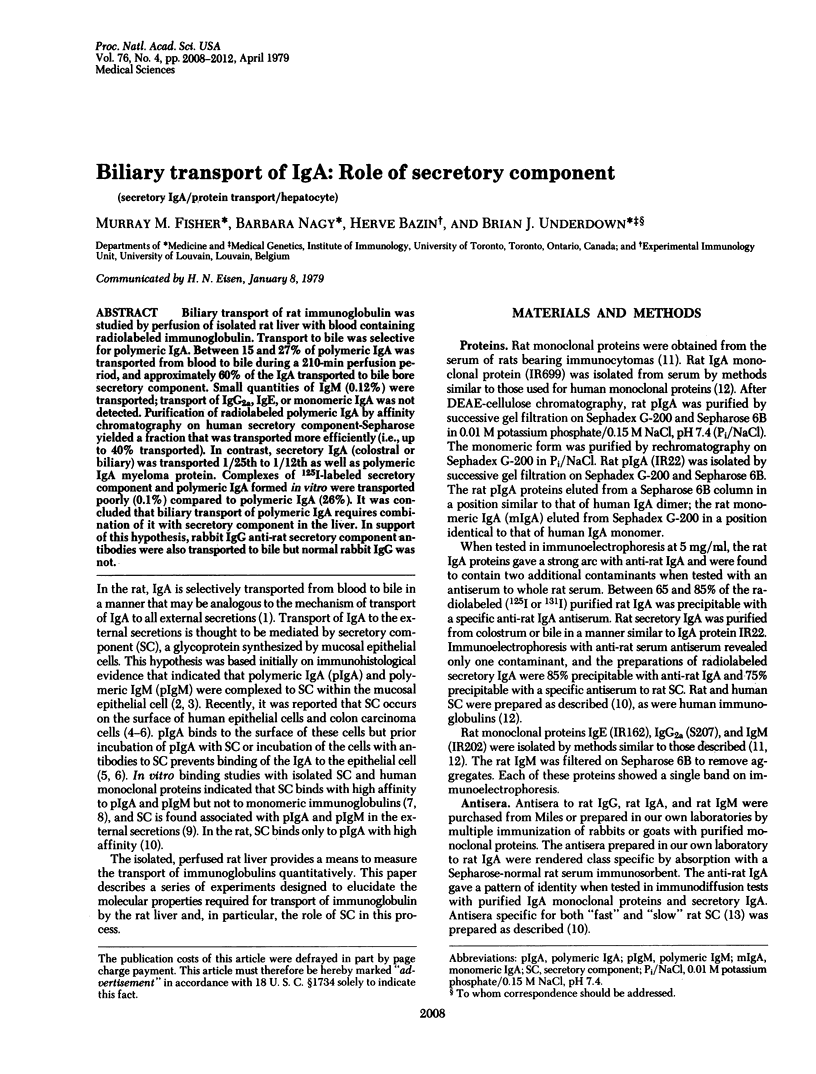
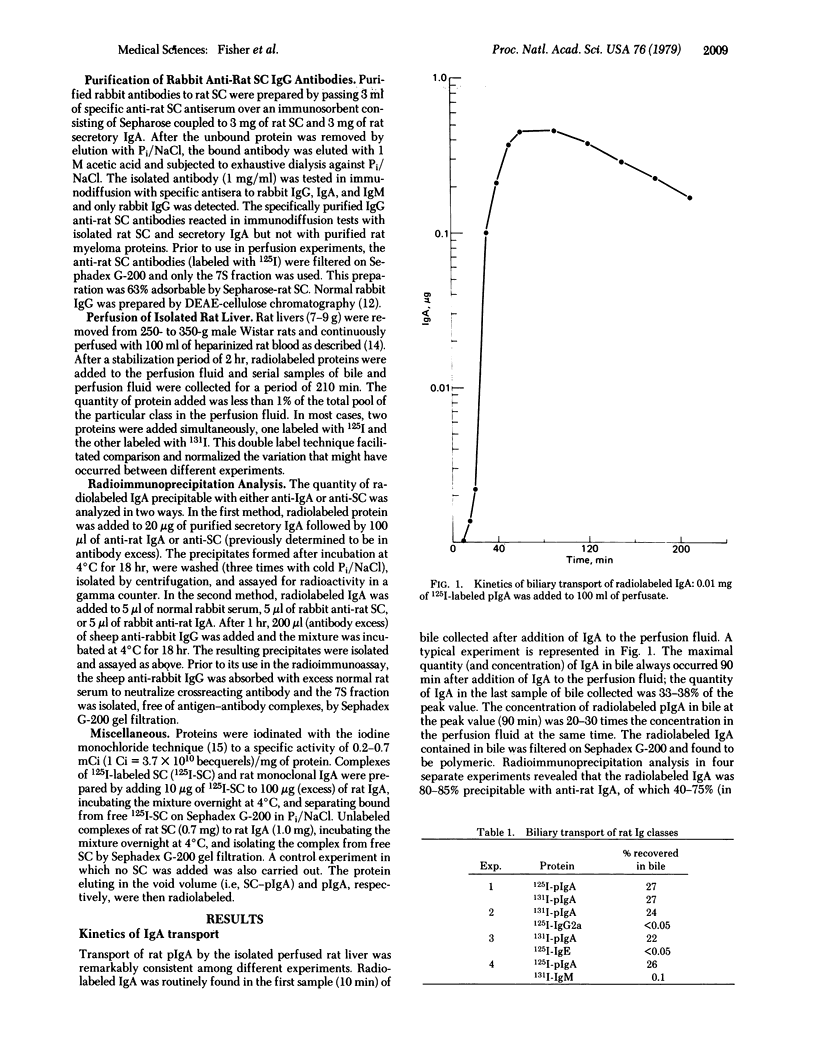
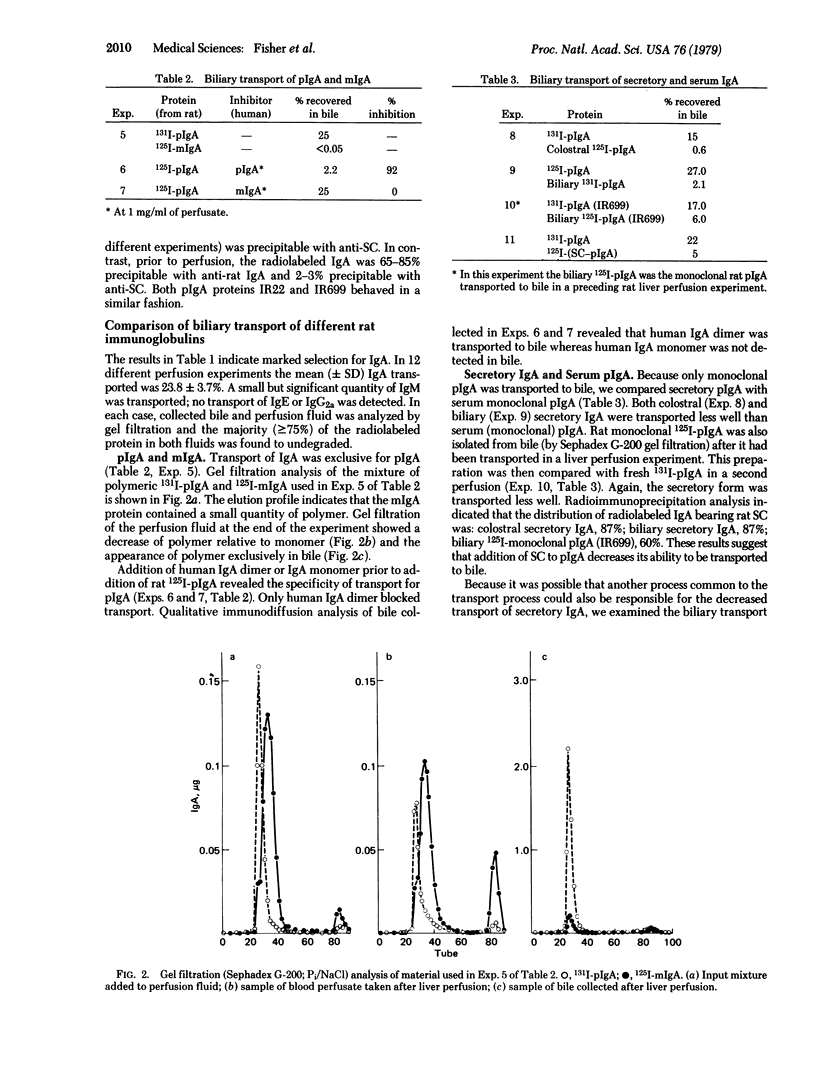
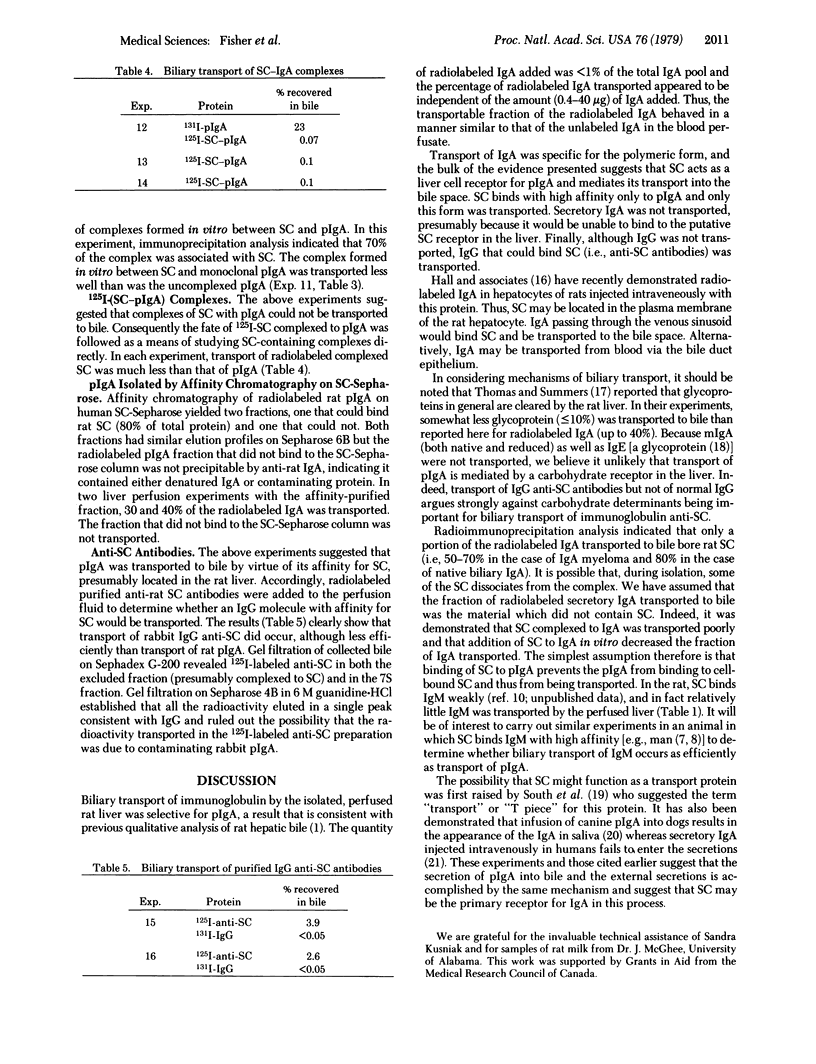
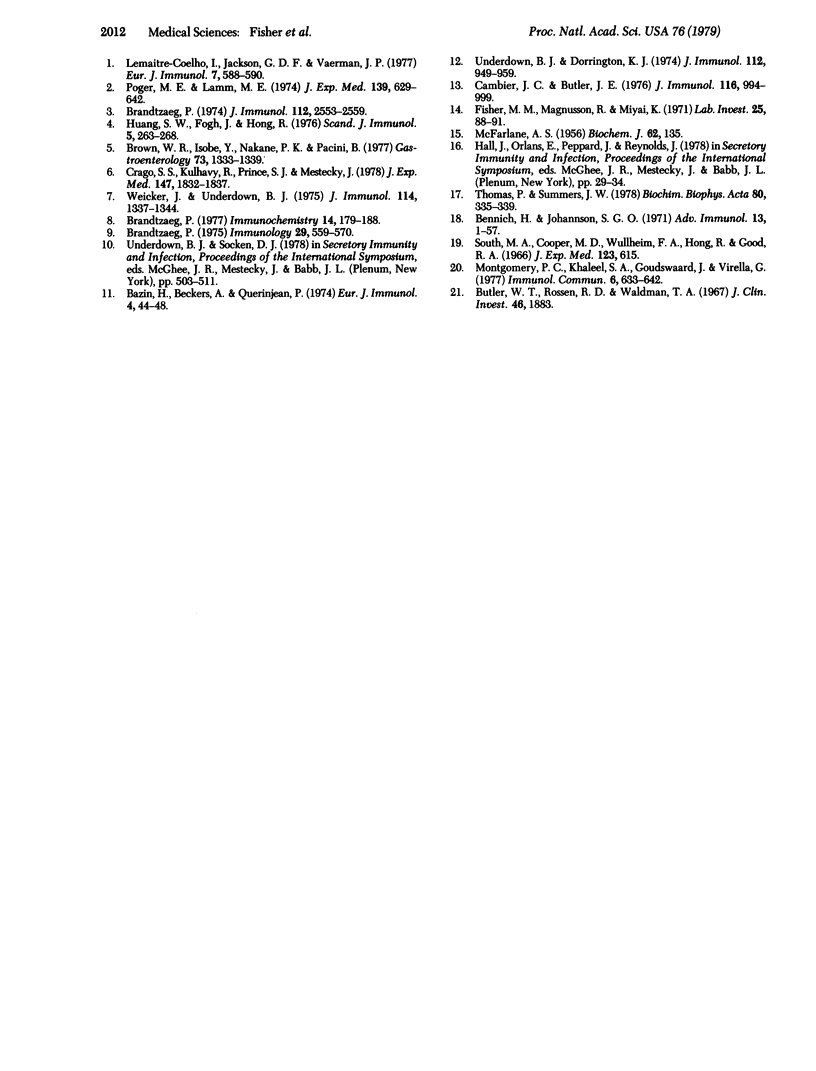
Selected References
These references are in PubMed. This may not be the complete list of references from this article.
- Bazin H., Beckers A., Querinjean P. Three classes and four (sub)classes of rat immunoglobulins: IgM, IgA, IgE and IgG1, IgG2a, IgG2b, IgG2c. Eur J Immunol. 1974 Jan;4(1):44–48. doi: 10.1002/eji.1830040112. [DOI] [PubMed] [Google Scholar]
- Bennich H., Johansson S. G. Structure and function of human immunoglobulin E. Adv Immunol. 1971;13:1–55. doi: 10.1016/s0065-2776(08)60182-0. [DOI] [PubMed] [Google Scholar]
- Brandtzaeg P. Human secretory component--VI. Immunoglobulin-binding properities. Immunochemistry. 1977 Mar;14(3):179–188. doi: 10.1016/0019-2791(77)90192-6. [DOI] [PubMed] [Google Scholar]
- Brandtzaeg P. Human secretory immunoglobulin M. An immunochemical and immunohistochemical study. Immunology. 1975 Sep;29(3):559–570. [PMC free article] [PubMed] [Google Scholar]
- Brown W. R., Isobe K., Nakane P. K., Pacini B. Studies on translocation of immunoglobulins across intestinal epithelium. IV. Evidence for binding of IgA and IgM to secretory component in intestinal epithelium. Gastroenterology. 1977 Dec;73(6):1333–1339. [PubMed] [Google Scholar]
- Butler W. T., Rossen R. D., Waldmann T. A. The mechanism of appearance of immunoglobulin A in nasal secretions in man. J Clin Invest. 1967 Dec;46(12):1883–1893. doi: 10.1172/JCI105678. [DOI] [PMC free article] [PubMed] [Google Scholar]
- Cambier J. C., Butler J. E. Two immunochemically and physicochemically distinct secretory components from rat exocrine secretion. J Immunol. 1976 Apr;116(4):994–999. [PubMed] [Google Scholar]
- Crago S. S., Kulhavy R., Prince S. J., Mestecky J. Secretory component of epithelial cells is a surface receptor for polymeric immunoglobulins. J Exp Med. 1978 Jun 1;147(6):1832–1837. doi: 10.1084/jem.147.6.1832. [DOI] [PMC free article] [PubMed] [Google Scholar]
- Fisher M. M., Magnusson R., Miyai K. Bile acid metabolism in mammals. I. Bile acid-induced intrahepatic cholestasis. Lab Invest. 1971 Jul;25(1):88–91. [PubMed] [Google Scholar]
- Huang S. W., Fogh J., Hong R. Synthesis of secretory component by human colon cancer cells. Scand J Immunol. 1976;5(3):263–268. doi: 10.1111/j.1365-3083.1976.tb00277.x. [DOI] [PubMed] [Google Scholar]
- Lemaître-Coelho I., Jackson G. D., Vaerman J. P. Rat bile as a convenient source of secretory IgA and free secretory component. Eur J Immunol. 1977 Aug;7(8):588–590. doi: 10.1002/eji.1830070818. [DOI] [PubMed] [Google Scholar]
- MCFARLANE A. S. Labelling of plasma proteins with radioactive iodine. Biochem J. 1956 Jan;62(1):135–143. doi: 10.1042/bj0620135. [DOI] [PMC free article] [PubMed] [Google Scholar]
- Montgomery P. C., Khaleel S. A., Goudswaard J., Virella G. Selective transport of an oligomeric IgA into canine saliva. Immunol Commun. 1977;6(6):633–642. doi: 10.3109/08820137709093472. [DOI] [PubMed] [Google Scholar]
- Poger M. E., Lamm M. E. Localization of free and bound secretory component in human intestinal epithelial cells. A model for the assembly of secretory IgA. J Exp Med. 1974 Mar 1;139(3):629–642. doi: 10.1084/jem.139.3.629. [DOI] [PMC free article] [PubMed] [Google Scholar]
- South M. A., Cooper M. D., Wollheim F. A., Hong R., Good R. A. The IgA system. I. Studies of the transport and immunochemistry of IgA in the saliva. J Exp Med. 1966 Apr 1;123(4):615–627. doi: 10.1084/jem.123.4.615. [DOI] [PMC free article] [PubMed] [Google Scholar]
- Thomas P., Summers J. W. The biliary excretion of circulating asialoglycoproteins in the rat. Biochem Biophys Res Commun. 1978 Jan 30;80(2):335–339. doi: 10.1016/0006-291x(78)90681-2. [DOI] [PubMed] [Google Scholar]
- Underdown B. J., Dorrington K. J. Studies on the structural and conformational basis for the relative resistance of serum and secretory immunoglobulin A to proteolysis. J Immunol. 1974 Mar;112(3):949–959. [PubMed] [Google Scholar]
- Weicker J., Underdown B. J. A study of the association of human secretory component with IgA and IgM proteins. J Immunol. 1975 Apr;114(4):1337–1344. [PubMed] [Google Scholar]


